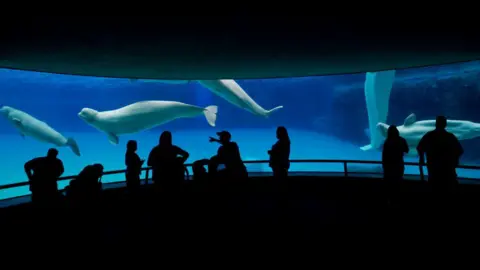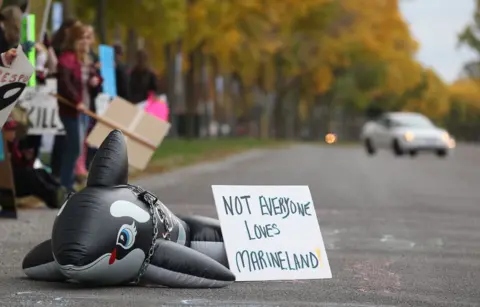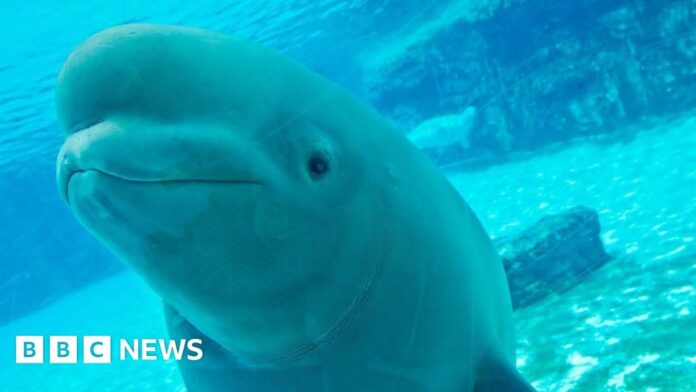For decades, Marineland was a destination for Canadian children and their parents who wanted an up-close look at ocean-life near Niagara Falls.
But behind the aquatic-themed roller coasters and dolphin performances was a dark history of documented mistreatment of animals and lingering financial problems.
Ontario’s Animal Welfare Services has conducted multiple investigations over the past several years, visiting the park more than 200 times since 2020, according to CBC News.
Amid financial struggles, the park has been trying to get permission to sell 30 beluga whales to China. When their permits were denied, the park said it may have to euthanise the whales.
Now advocates, experts and officials are looking for ways to save the whales – though few agree on one solution, and some say Marineland’s threats to kill its whales are all talk.
 Getty Images
Getty ImagesThe massive aquatic park, started by John and Marie Hole in 1961, sits on over 1,000 acres (400 ha) of prime Ontario real estate.
But what was once a beloved attraction with a catchy commercial jingle has faced growing scrutiny over its care for animals, which also included land animals like bears and elk.
In 2019, Canada passed a bill making it illegal to hold a whale, dolphin or porpoise captive.
The legislation created protections for any future animals, but not for the animals already in captivity, leaving little room for federal government involvement with the whales at Marineland.
Criticisms of the park date back several years, and in 2020 Animal Welfare Services opened an investigation into the park.
That investigation led to the provincial animal welfare agency declaring that all the park’s marine life was under distress because of poor water quality. By 2024, after investing in new technology, the water quality had been improved, the provincial government told the Canadian Press news agency.
But that same year, Marineland was found guilty, under Ontario’s animal cruelty laws, of abusing and neglecting three young black bears who were kept in small enclosures with inadequate access to water for months.
In total, twenty whales – one killer whale and 19 belugas whales – have died at Marineland since 2019, according to the Canadian Press. The company has said the animals were well treated, and the deaths were part of the natural life cycle.
Park facing bankruptcy
Attendance at the park has drastically declined, and this spring it did not open to tourists, as it usually did. Many assume bankruptcy is inevitable.
“Unfortunately, they’re telling us they’re burning the furniture to heat the house,” Niagara Falls mayor Jim Diodati told Radio-Canada on Friday. “There’s no money.”
Park officials say they cannot afford to continue caring for the animals, and so they must find them a new home. Marineland applied for a permit from the federal government to sell the whales to a theme park in Zhuhai, China.
But Fisheries Minister Joanne Thompson said the whales would face similarly substandard treatment as “public entertainment” in the Chinese park, and denied Marineland’s request.
A number of organizations agreed with Thompson that the park in Zhuhai was not a suitable option.
Then last week, the park shocked many when it told the government it may have to euthanise the whales. It has asked the Canadian government for funding to continue to care for the animals instead.
A Marineland letter to the fisheries ministry, obtained by the BBC, said that whatever happens to the animals would be “a direct consequence of the minister’s decision”.
That assertion was not well received by the government.
“The fact that Marineland has not planned for a viable alternative despite raising these whales in captivity for many years, does not place the onus on the Canadian government to cover your expenses,” Thompson said in a letter to Marineland, obtained by the BBC.
The current status of the whales remains unclear. Marineland did not respond to a BBC request for comment.
But Phil Demers – who worked for 12 years as a senior trainer at Marineland and has since become an outspoken critic – told the BBC that there were limited options, besides the one in China, that could take all 30 whales at one facility.
He believes the best-case scenario for the whales is any option that gets them out of Marineland, quickly.
Without China, he thinks the best possible outcome is a coalition of US facilities each taking a handful of whales.
“These animals need to be out of those waters, yesterday,” Mr Demers said.
 AFP via Getty Images
AFP via Getty ImagesClock ticking on finding whales new homes
Others say the conditions warrant the provincial government stepping in and seizing the whales.
Ontario can appoint inspectors to assume care of animals in distress and recover costs from the facility’s owner, under the Provincial Animal Welfare Services (PAWS) Act.
That is a first step many want to see Ontario Premier Doug Ford take.
“Premier Ford needs to realize whether he likes it or not, Ontario has primary jurisdiction over captive wildlife within the province’s borders,” Colin Saravanamuttoo, Executive Director of World Animal Protection Canada, said. “This game of chicken between Marineland, the province and Ottawa is totally unacceptable – Premier Ford needs to step up, lead and stop passing the buck.”
The Whale and Dolphin Conservation, an animal welfare organisation, also wrote to Ford asking him to commission independent veterinary assessments of each whale so “that every individual receives a humane and compassionate outcome”.
Ford’s office did not return the BBC’s request for comment.
The Whale and Dolphin Conservation wants to see the whales sent to a sanctuary in Nova Scotia run by The Whale Sanctuary Project.
But there are some caveats.
Charles Vinick, Chief Executive Officer of the Whale Sanctuary, said that facility will not be ready until next summer and will only be able to take eight to ten of the whales.
“There is no open sanctuary who can accommodate them today or tomorrow,” he said.
For now, as options for how to save the whales continue to be discussed, there’s widespread confidence that Marineland’s talk of euthanasia is just talk.
“The whole threat of euthanasia is a bluster,” Mr Demers, the former Marineland employee, said.
But the clock is ticking to find a solution that gives these animals a better, safer life.
“It’s going to take more than one person, or one organization to provide these animals the quality life they deserve,” Mr Vinick said.
Source link







